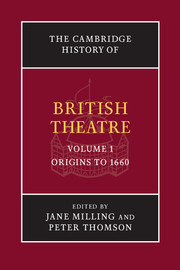Book contents
- Frontmatter
- PART I PRE-ELIZABETHAN THEATRE
- PART II ELIZABETHAN THEATRE
- 5 The development of a professional theatre, 1540–1660
- 6 Drama outside London after 1540
- 7 ‘An example of courtesy and liberality’: great households and performance
- 8 The birth of an industry
- 9 Theatre and controversy, 1572–1603
- 10 The condition of theatre in England in 1599
- 11 Ben Jonson's Every Man in his Humour: a Case Study
- 12 London professional playhouses and performances
- PART III JACOBEAN AND CAROLINE THEATRE
- Works Cited
- Index
- References
6 - Drama outside London after 1540
from PART II - ELIZABETHAN THEATRE
Published online by Cambridge University Press: 28 March 2008
- Frontmatter
- PART I PRE-ELIZABETHAN THEATRE
- PART II ELIZABETHAN THEATRE
- 5 The development of a professional theatre, 1540–1660
- 6 Drama outside London after 1540
- 7 ‘An example of courtesy and liberality’: great households and performance
- 8 The birth of an industry
- 9 Theatre and controversy, 1572–1603
- 10 The condition of theatre in England in 1599
- 11 Ben Jonson's Every Man in his Humour: a Case Study
- 12 London professional playhouses and performances
- PART III JACOBEAN AND CAROLINE THEATRE
- Works Cited
- Index
- References
Summary
Local dramatic activity
The dominant trend outside London from 1540 to 1642 was the disappearance of late medieval traditions of dramatic activity without the creation of new forms to replace them, so that by the time parliament prohibited public performing in 1642, very little remained. Economic distress in both provincial towns and rural areas contributed to the decline in dramatic activity outside the capital, but the Reformation had the greatest impact. In fact, to plot in space and time the suppression or abandoning of forms of entertainment ranging from biblical cycles and parish plays to king ales, maypoles and morris dancing is effectively to map the progress of the Reformation across the English landscape. That progress was gradual, at first affecting only those elements of the traditions that too obviously reflected Roman Catholic theology and practice. The feast of Corpus Christi was suppressed in 1548, forcing the biblical cycles to shift to Whitsun or some other convenient date, and some plays were dropped from the cycles around this time. The reign of the Catholic Mary Tudor briefly reversed the process in the mid 1550s, but when the Protestants returned to power with Elizabeth, they intensified their efforts to eradicate anything associated with the Roman church, eliminating the major cycle plays in the 1560s and 1570s. Other town- and parish-sponsored drama lasted as long, and often longer, especially in places remote from London. Eventually, however, the traditionalists gave way before the increasing numbers and power of those whom they called ‘puritans’, those who valued the sober industriousness of the individual and the preaching of God's word over the festive communal rituals provided by the old dramatic traditions.
- Type
- Chapter
- Information
- The Cambridge History of British Theatre , pp. 178 - 199Publisher: Cambridge University PressPrint publication year: 2004

